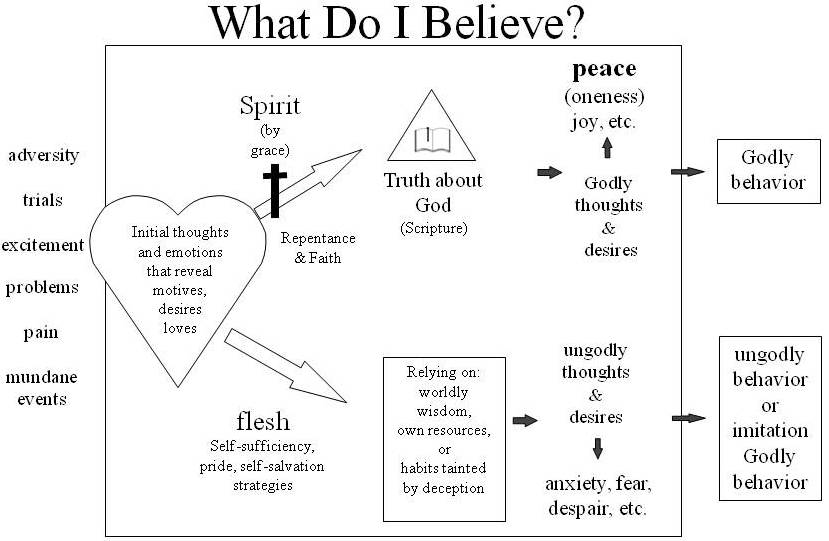 Believe/belief/trust means to be persuaded (firm persuasion), to place confidence in (full assurance).
Believe/belief/trust means to be persuaded (firm persuasion), to place confidence in (full assurance).
All of these will be present when you believe, trust, or have faith:
1) you know who God is (from Scripture)
2) you agree with what He says about Himself
3) your actions/thoughts agree with that truth
(If you think you believe or trust God in an area, look to see if your thoughts and actions confirm that.)
Using the belief system chart:
Peace, or lack of it, is a good indicator of what you believe about God and who or what you are worshiping in that moment. When your heart is aligned to value God’s values and in step with the truth of God’s Word you will experience the peace of God in your life (Isaiah 26:3, Philippians 4:7). A lack of peace makes you aware something is amiss and that the intentions and desires of your heart are not in concert with His. If your belief is in line with worldly wisdom and your own selfish desires, the result is anxiety (Philippians 4:6-7), a fearful and troubled heart (John 14:1, 27), despair (Psalm 42:5, 11), anger (James 1:19-20) and other sin.
Adversity, trials, mundane events, problems, pain - As the events of your life play out, you have an inward reaction to each of them. Even the most mundane event has correlating initial thoughts and emotions, such as restlessness or boredom. Happy events can trigger excitement, joy or even suspicion that it won’t last. Usually, you are not even aware of your corresponding thoughts, desires or fears. You are even less aware of what your reactions reveal about what you believe about God. It often takes painful circumstances to bring you to that level of consciousness, so it is generally pain that God uses to make you aware of what is going on in your heart. Pain is designed to move you toward God and allow His purifying process to do the work of transforming your heart and mind.
God uses trials and adversity to expose underlying wrong thinking and selfish and inordinate desires of the heart (James 4:1-6) in order to reorient your heart and life more fully and consistently worship him (Hebrews 12:3-11) and thus to experience life abundantly (John 10:10). The process of recognizing your areas of unbelief or lack of trust in God can be excruciating because you have spent your whole life rationalizing, denying, avoiding, minimizing or justifying your thoughts, emotions and behaviors. Ask God to enable you to embrace the pain instead of running from or ignoring it.
Intitial thoughts and emotions - God designed you with emotions because He created man in His own image and He has emotions. Because of the fall, our emotions are not pure like His are. They are intertwined with deception and depravity. The question is what are you going to do with these emotions? Are you going to let them determine your actions or are you going to filter them through the truth of who God is according to His Word? The only way to do that is to recognize that you cannot change how you feel, only Christ can.
Picture of the cross (on the chart): Jesus paid in full on the cross for the destruction, delusion and depravity of your wrong desires. As you humbly acknowledge His forgiveness you can then receive His power (grace) to experience that emotion in pure form, reflecting His true character.
The belief system concept will be a thread running throughout the whole course and you may need to come back to this illustration many times. You should soon learn to trace anxiety, despair or a troubled heart back to the root of unbelief about God’s character.
Begin now asking the question, “What is it I don’t believe (trust) about Him or His character?” when you experience the lack of peace in your life.
You will see this question throughout the course to remind you to stop and consider what God has used in that lesson to orient you back toward Himself:
What are you believing (or not believing) about God that needs to be filtered through the truth about Jesus to enable you by the Spirit to move toward God?